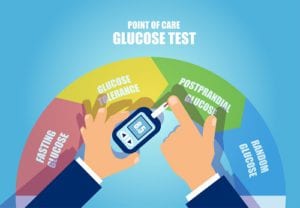Diabetes is a controllable disease. Thus, a serious question is “Can Diabetes Cause Anxiety?” Individuals suffering from diabetes have concerns about measuring insulin levels, counting carbohydrates, and thinking about health for the long-term. However, people with diabetes experience more intense concerns and this results in anxiety.
I’d like to help you understand the connection between diabetes and anxiety. Let’s further understand how to treat the symptoms. Research has revealed a strong connection between anxiety and diabetes. A study found that 20 percent of Americans having diabetes are diagnosed with anxiety than people without diabetes. It was found to be true in young adults.

What is Anxiety?
Anxiety is a nervousness, worry or fear feeling. The worries or fears may include concern about one’s health, family, or tension before an interview test, etc. This disorder is when the worry goes out of hand. It is associated with physical symptoms connecting to the lungs, heart, gastrointestinal and nervous symptoms.
- It includes breathlessness, diarrhea, or a heart attack feeling. This response is a stress response system activity, leading to stress hormone secretion, increased heart rate, restlessness, fear of some threatening situation, and vigilance.
External factors such as school, work stress, personal stress or relationships due to emotional trauma such as physical abuse or a loved one death, or certain drugs side effects or serious medical illness cause anxiety.
The anxiety disorders are in several types such as social anxiety disorder, generalized anxiety disorder, phobia, post-traumatic stress disorder, and panic attacks. As if this isn’t enough?
- Experiencing stress of high levels includes various situations, and it is known as GAD. GAD diagnosis is done when the symptoms of any three or more exist over six months. The symptoms are fatigue, irritability, six months restlessness, sleep disturbance, muscle tension, difficulty in concentration.
The panic attack includes signs such as sweating, rapid heartbeat, fear of dying, dizziness, hot or chills flushes, and chest pain. It’s a scary feeling for sure!
How Are Type 2 Diabetics Affected by Anxiety?
Time and again everyone experiences anxiety, but with diabetes, the anxiety disorder is associated with fear and worry feelings. This becomes uncontrollable and overwhelming that over time they even worsen. People with anxiety have disturbing thoughts. They try to avoid situations causing distress. Besides, most people with diabetes have high blood pressure as a physical symptom.
A diabetic person is affected by an anxiety disorder and it is a medical condition. A clinical diagnosis is very important and the difference of anxiety felt every day should be diagnosed to understand the impairment degree in life. A diabetic person may take care of their family and also perform job tasks, but how the anxiety levels affect them in attending those obligations should be understood.
The Relationship Between Anxiety and Glucose
Stress affects blood sugars and it gets mixed raising the blood glucose levels. The conditions of mental health such as depression and anxiety are high in men. Though a study also confirmed that the glycemic control was not affected by general anxiety, the emotional stress had relation to diabetes-specific triggering anxiety.
It is also found that type 1 diabetes is more prone to physical harm due to stress. At the same time, one’s personality also determines the effect to a great extent.
Causes of Anxiety in Diabetics
Diabetic people may become anxious about various things. These may include anything monitoring their diet, weight, and glucose levels. They may worry about their health complications. They are also at high risk for health complications such as kidney disease, heart disease, and stroke. Understanding these risks also leads to anxiety.
Diabetic people have multifaceted causes of anxiety. For starters, the testing of blood glucose every day is a hassle. Even taking medication regularly and managing diabetes may cause stress. They worry about traveling, trying new foods, and healthcare costs. This results in diabetes complications and this is seen as a serious toll on their family. The scary thought of kidneys worsening and going on dialysis makes them scarier, leading to increased anxiety levels.
Anxiety Symptoms
Anxiety symptoms usually stem from a stressful situation or stress. Anxiety is a stage where the diabetic person feels more stressed. It is unrealistic, excessive worry that interferes with daily life and relationships. The anxiety symptoms vary with each person. There are several anxiety disorders types and it includes:
- Generalized anxiety disorder
- Panic disorder
- Separation anxiety disorder
- Obsessive-compulsive disorder
- Selective mutism
- Post-traumatic stress disorder
- Specific phobias
Each disorder has distinct symptoms, yet the common anxiety symptoms include rapid heart rate, restlessness, panic, being tense, heavy sweating, lethargy, weakness, insomnia, difficulty in thinking or focusing, constipation, gas, diarrhea, anxiety even over some experience or event.
Trying to determine if the anxiety level is due to blood sugar fluctuations or psychological reasons may be tough as both hyperglycemia and hypoglycemia symptoms represent anxiety symptoms. But the symptoms and signs persist as anxiety disorder same as the fluctuations in blood sugar.
Anxiety disorder symptoms include:
- An edge feeling or restlessness
- Muscle tension
- Mind goes blank
- Concentration difficulty
- Irritability
- Easily fatigued
- Sleep problems
There is an exception in this disorder associated and that is panic disorder. The panic attacks are short-lived and intense lasting for 15 to 20 minutes. These attacks are not due to a specific event or thought, but happens suddenly and people do not realize how and where or why it came from.
Panic disorder symptoms include:
- Shortness of breath, choking
- Sweating
- Racing heart or heart palpitations
- Shaking or trembling
- A feeling of a heart attack
Because the anxiety and blood sugar fluctuations mimic each other, speaking to a doctor first is important. They will help you to rule out the issue of blood sugar before you consider treatment for anxiety. Let the professional make the decisions.
If you believe you suffer from an anxiety disorder, your therapist or your primary care physician can make the diagnosis. They will ask you to fill a questionnaire or ask several questions to understand the anxiety disorder reasons.
How Does Diabetes Cause Anxiety or Vice Versa?
A person having diabetes, start worrying or fear the illness when they are not in control of their diet or lifestyle pattern. This leads to frustration. People spotted with diabetes are mostly concerned about the implication, macro, and microvascular complications, before they occur.
People with diabetes worry excessively about their family, thinking of their death. They feel insecure and this is known as the fear of hypos. This excessive worry leads to ‘social anxiety’. They fear to leave the place of comfort or their own house, being around strangers and also avoid social interaction.
Type 2 diabetes patients are diagnosed more with depression and anxiety. Women experience more anxiety than men.
Should a Person With Diabetes Take Anxiety Disorder Seriously?
Diabetes identified people always have a direct or indirect effect on the illness. The risk of complications, fear of hypos, and daily management slowly increases the levels of anxiety. Subsequently, anxiety disrupts their metabolic control and management, thereby leads to complications such as high sugars.
Chronic anxiety results in physiological effects. This leads to an increase in the stress hormone levels and escalates the levels of sugar. The mind is their enemy and so nothing else works well with them. Their excessive anxiety disturbs their eating habits, they have difficulty in concentration, unable to perform physical activity and also fail to do their daily tasks.
How Can a Diabetic Person Offset or Reduce Anxiety?

A diabetic person can reduce anxiety levels by learning or practicing to manage stress. There are several techniques that help in relaxation such as deep breathing, yoga, meditation, and muscle relaxation. These are effective in decreasing anxiety levels.
A human being’s mental and physical health is inter-twined continuously. Thus, with the combination of medication, there is a need to include psychotherapy. There is a need to follow time-management and learn to cope with skills so that it helps in combating the anxiety levels and stress.
It is equally important that one should not be hard on oneself. They also should not be over-demanding on others or even on themselves. The main keyword to follow is flexibility. The person’s family must offer good understanding and emotional support.
The individual should be given reassurance that they are undergoing a medical condition known as an anxiety disorder. However, this medical condition happens on its own that she or he cannot take the blame. Apart from this, the family members of the diabetic person should give them continuous hope for recovery.
Treatment for Anxiety
There are a variety of anxiety orders, and the treatment for each varies. However, in general, the most common treatments for anxiety include:
Lifestyle Changes

The changes in lifestyle include avoiding alcohol, performing an exercise, limiting caffeine, following a healthy diet, and sleeping regularly. These help in calming anxiety.
Therapy
If managing anxiety is found to be difficult even with lifestyle changes you may have to make an appointment with a mental health provider. They will suggest some therapy techniques and this helps in treating the anxiety. The therapies are:
- CBT- cognitive behavioral therapy that teaches you to identify anxious behaviors and thoughts and to change them
- Exposure therapy is where you are exposed to things making you anxious so that you manage your feelings.
Medications
Medications are prescribed to cure anxiety and the common medications are:
- Antidepressants
- A benzodiazepine for panic attack relief
- Anti-anxiety medication namely buspirone
Final Takeaway
Can Diabetes Cause Anxiety? Anxiety disorder treatment shows a good and effective response, yet only a few diabetic people with anxiety disorders get treated. Thus, there is no valid reason for you to suffer from anxiety in silence. It is because it may hinder you from living a full, happy life. The fact cannot be denied that depression and anxiety are prone to the risk of death in a higher ratio.
It is supportive if you are in contact with an anxiety or diabetes group. It helps in beating anxiety or coping with it at least. It helps in thinking and rationalizing, and this helps in treating depression and anxiety.
If you have recently identified that you have diabetes, or you already are a diabetic, and now anxiety disorders seem to get associated, you must call the primary care physician to prescribe medication.
The primary care physician may prescribe medication, however, if our mental health diagnosis is serious, such that the anxiety levels are high, there may be drug interactions. There are possibilities that you are unable to find a medication or a proper and effective treatment. If so, it is best to consult a psychiatrist.
If there is a family member or your friend suffering from diabetes type 1 or 2 and is associated with anxiety disorders, it is a must for you to be positive. A very important point to remember is to avoid giving or try giving any advice, also avoid blaming them or trying to fix them.
People with diabetes-associated anxiety are not prepared to hear, they just want people or others to be heard. The best is to listen to them and coax them slowly into their good for health activities. As a well-wisher, you also may have to participate actively, and it is best for you.
In Conclusion
Can Diabetes Cause Anxiety? There is a strong link between diabetes and anxiety. Diabetic people wish to manage stress making changes in the lifestyle such as exercise, diet and involve in other stress-relieving activities.
On noticing symptoms that become unmanageable even on following the changes, you can consult with a doctor. They help in determining and managing anxiety as the best strategies.
Practicing sleep hygiene, practicing better management of your time, exercising, and eating balanced meals are a few ways of finding relief. There is a need to calm your body so that it deals with day to day stress.
There are medications of different types to take and it helps to manage anxiety. These medications are well-matched with diabetes medications. Though you may visit a doctor regularly, you should keep your doctor informed of what you take to be on the safer side.
This is because like all other medications, the anxiety treatment drugs also carry side effects, and they start working if you take after six weeks.
Check Out Below the Best Way
to Lower Your Blood Sugar Fast!
Please share on social media below and forward this to others who need help and please leave any questions or comments you may have below. I would love to interact with you. Thank you for reading and I appreciate it!
- Amazon Kindle Edition
- Rothchild, Sascha (Author)
- English (Publication Language)
- 336 Pages - 04/19/2022 (Publication Date) - G.P. Putnam's Sons (Publisher)
- ✅ QUICK AND EASY TO USE: Care Touch blood sugar test kit delivers results in only 5 seconds with just a 0.5µL blood sample. There is no programming needed since our blood sugar monitor kit automatically recognizes batch codes encrypted on Care Touch glucose test strips. Our state-of-the-art glucometer kit with strips and lancets includes single-touch strip ejection, so you can hygienically remove used diabetic test strips.
- ✅ EASY DIABETIC MONITORING: The blood sugar monitor kit with strips is capable of saving up to 300 readings. The blood glucose test kit also provides a continuous 14-day average of your readings, making glucose monitoring easy for you and your healthcare provider.
- ✅ PORTABLE AND HASSLE-FREE: The diabetic testing kit comes with a handy glucometer case, which means you can check your blood sugar level at home or anywhere else while staying organized. The 10-depth lancing device and lancets will help make blood sugar testing almost painless and hassle-free.
- ✅ COMPLETE DIABETIC SET: The glucose meter kit with strips and lancets includes: (1) Care Touch Blood Sugar Meter, (100) Blood Glucose Test Strips for diabetes, (1) Lancing Device, (100) Lancets for diabetes testing, (1) 3 Volt Lithium Battery, (1) Glucose meter case for your blood sugar tester and diabetic supplies
- ✅ WE CARE BECAUSE YOU CARE: You care about your health, and we care about you. Care Touch is committed to providing the best quality blood glucose monitoring systems. Our care doesn’t end when your sugar tester diabetes kit arrives at your door. We’re fully dedicated to your satisfaction. If you have any questions or concerns about your glucose monitor kit with strips and lancets - contact us at any time.
- Amazon Prime Video (Video on Demand)
- English (Playback Language)
- English (Subtitle)
- PUREHEALTH RESEARCH - Blood Sugar Formula 3 Bottles
- MANUFACTURED in the USA! 365-DAY SATISFACTION GUARANTEED!
- A DOCTOR-APPROVED NATURAL FORMULA. Seventeen potent ingredients, each scientifically proven to have a significant effect at helping balance your glucose levels, improve glucose sensitivity, protect delicate cells from free radicals, and energy
- HIGH POTENCY. PureHealth Research experts scientifically enhance CHROMIUM with the Vitamin C, E, Mulberry Leaf, Bitter Melon, Cinnamon, L-Taurine, Berberin and other ingredients which are proven to help you support healthy blood glucose levels
- ONE CAPSULE DAILY, THREE BENEFITS: supports healthy sugar and carb absorption, supports insulin levels, supports cardiovascular health
- Scientifically formulated; great care was put into combining just the right amount of 20 different ingredients into a premium formula designed to support healthy blood sugar levels
- High potency support for 365 days a year; the unique combination in this blend is crafted to help support healthy glucose absorption and glucose production by your body; contains Gymnema, Alpha Lipoic Acid, Yarrow, Licorice, Cayenne, Banaba, Guggul, Bitter Melon, Juniper Berry, White Mulberry, L-Taurine & more
- One capsule twice a day, five benefits; (1) supports normal blood sugar levels; (2) supports weight control and energy; (3) supports healthy sugar and carb absorption; (4) supports insulin levels; (5) supports heart health; daily support for healthy blood glucose levels, 365 days a year
- Reliable; made in a GMP certified facility in America and third party safety tested for purity
- Great value for money; 120 vegetarian capsules for a 60 days supply
Last update on 2022-06-23 / Affiliate links / Images from Amazon Product Advertising API














Diabetes runs in my family and I have seen the results of the disease beyond the physical aspect. It is indeed very stressful to have to be monitoring it on a regular basis and constantly be wondering how your body will respond if you do not eat at a certain time.
I would like to note that anxiety can also occur in those who must take care of those with diabetics, especially if they are small children or the elderly who often cannot express that their bodies are responding to a lack or or too much sugar.
Sorry to hear that diabetes runs in your family. This is a serious disease that we must control.
And those of us who do experience anxiety know all to well what it does to us.
But the fact is that diabetes can also help cause anxiety. Controlling our sugars, eating healthy, and exercising are the things that are important.
And I agree that anyone taking care of a diabetic may certainly have anxiety issues as well!
Thank you for your feedback! 🙂